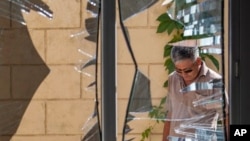Uighur activists and experts alike welcomed the removal of the East Turkistan Islamic Movement (ETIM) from the U.S. terrorist list, saying the move by Washington last month helps the religious minority fight more effectively for its rights, while making it harder for China to portray its crackdown in Xinjiang as a counterterrorism measure.
“To some degree, the Chinese government succeeded in labeling Uyghur organizations and personnel as terrorists in some international platforms,” said Ilshat Hasan Kokbore, a member of Munich-based World Uyghur Congress (WUC), which China has accused of being a group of “East Turkistan terrorist forces.”
The ETIM, also referred to as the East Turkistan Islamic Party (ETIP), was founded in 1997 in Pakistan by then-33-year-old Uighur religious figure Hasan Mahsum, who was living there in exile. The leader reportedly had led a few dozen Uighur militants in the Afghanistan and Pakistan border region before being killed by a Pakistani army drone in October 2003.
The U.S. designated the group in September 2002, accusing it of terrorist acts, such as arson, assassination, and bombing of buses, movie theaters, department stores, markets and hotels in China. The U.N. followed suit the same month, upon a request by the U.S., China, Afghanistan and Kyrgyzstan.
U.S. Secretary of State Mike Pompeo, in a brief October 20 directive that was published November 5, revoked the terror designation. The decision, according to a State Department spokesperson quoted by Agence France-Presse, came because “for more than a decade, there has been no credible evidence that ETIM continues to exist.”
Part of a trade-off
James Millward, a professor of Chinese history at Georgetown University, told VOA the U.S. listing of ETIM originally used language from a PRC white paper but mistakenly attributed a long list of violent acts from the white paper to a single group, ETIM.
The designation, Millward said, “was part of a tit for tat to get PRC's endorsement of the U.S. plans to invade Iraq.”
“[T]he think-tank and counterterrorism world, on the other hand, have used the U.S. listing and PRC propaganda far too credulously to talk about terrorism in Xinjiang as an ongoing, even escalating reality,” Millward added.
Another Chinese history professor, Michael Clarke from Canberra-based Australian National University, said the ETIM has lacked capacity to harm China since the death of its leader, Mahsum, in 2003. Nevertheless, authorities in Beijing continue to exaggerate its strength to gain international sympathy for their policy toward minority Uighurs.
“The ETIM designation has been used by Beijing ever since 2002 as a blanket term deployed against any and all violence and opposition to the state in Xinjiang in order to delegitimize Uighur grievances and justify increased repression,” Clarke said.
Human rights organizations say China since early 2017 has used fighting extremism and separatism as an excuse to hold more than 1 million Uighurs in internment camps where they face torture, indoctrination and forced labor. The organizations say the rest of the Uighur population in Xinjiang lives under heavy state surveillance.
Suppression cited, not terrorism
“The overwhelming majority of the violence in the Uighur region of China since 2001 cannot be characterized as terrorism,” said Sean Roberts, a professor at George Washington University.
“Often, this violence has erupted when peaceful protests have been suppressed by security organs, and much of it can be attributed to violent responses to police brutality,” Roberts told VOA.
China, however, rejects allegations of human rights violations in Xinjiang. Chinese officials have called the detention camps “vocational training schools” where “students who were infected by extremist thoughts learn Chinese law, language and skills” in order to become “normal” people.
Chinese foreign ministry spokesperson Wang Wenbin, in a news conference November 6, said his country “deplores and firmly opposes” the removal of ETIM from the U.S. terror list.
Describing the group as posing “serious threats” to security and stability in China, Wang said the U.S. had “flip-flopped” and exposed “the current U.S. administration's double standard on counterterrorism.”
“The United States should immediately correct its mistakes, refrain from whitewashing terrorist organizations and stop backpedaling on international counterterrorism cooperation,” Wang told reporters from Beijing.
Exiled Uighur activists, contrary to China’s party line, say the U.S. decision is an important step to recognize the plight of Uighurs who have been deprived of basic cultural and political rights under the PRC.
Salih Hudayar, founder and director of the Washington-based East Turkistan National Awakening Movement, said the State Department decision is equally important for Uighur Americans who have been afraid of using their preferred term “East Turkistan” instead of Xinjiang lest they be associated with this ETIM group.
“Many Uighurs defaulted to calling it ‘Xinjiang,’ which means ‘new territory’ in Chinese, even though most Uighurs consider it to be an offensive, colonialist term designed to erase our identity, culture and history,” Hudayar told VOA.




